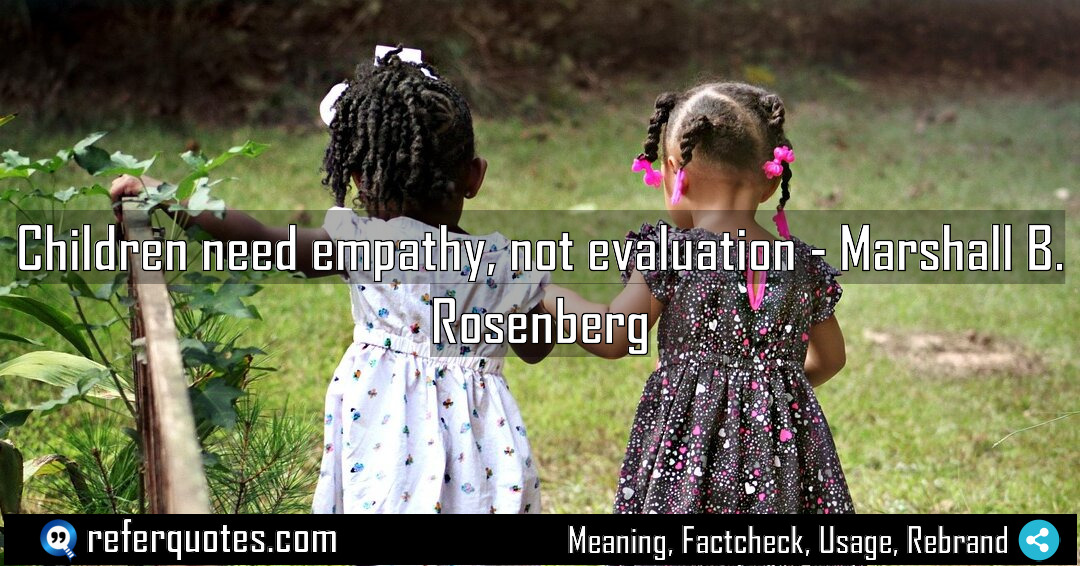
You know, when Marshall Rosenberg said “Children need empathy, not evaluation,” he hit on something so fundamental. It’s a game-changer for how we connect with kids, shifting our focus from judging their behavior to understanding their feelings. Let’s break down why this approach is so powerful.
Share Image Quote:
Table of Contents
Meaning
At its heart, this quote means that a child’s emotional world requires connection and understanding first, before any kind of assessment or judgment.
Explanation
Okay, so let me explain how this plays out in real life. For years, I saw how our default mode is to evaluate. A kid comes home with a C on a test, and we say, “You should have studied more,” or a toddler has a meltdown and we label it “bad behavior.” That’s evaluation. It’s like we’re a judge handing down a verdict.
Empathy is the complete opposite. It’s getting down on their level and trying to see the world through their eyes. It’s saying, “Wow, you seem really frustrated that your tower fell down,” or “It looks like you’re feeling disappointed about that grade.” You’re not agreeing or disagreeing with their actions; you’re just connecting with the feeling underneath. And here’s the magic—when a child feels truly heard and understood, that’s when the defenses come down. That’s the doorway to real cooperation and learning. It’s not about permissiveness; it’s about connection before correction.
Quote Summary
Reading Level55
Aesthetic Score86
Origin & Factcheck
This wisdom comes straight from Marshall B. Rosenberg’s 2005 book, Raising Children Compassionately: Parenting the Nonviolent Communication Way. It’s a core tenet of his Nonviolent Communication (NVC) framework, developed in the United States. You sometimes see similar sentiments floating around, but this specific, powerful phrasing is Rosenberg’s.
Attribution Summary
Where is this quotation located?
| Quotation | Children need empathy, not evaluation |
| Book Details | Publication Year/Date: 2004; ISBN/Unique Identifier: 9781892005140; Last edition: PuddleDancer Press, 1st Edition, 48 pages. |
| Where is it? | Chapter: Listening to Children, Approximate page from 2004 edition |
Context
Rosenberg placed this idea within his larger NVC model, which is all about fostering compassionate relationships. In the book, he argues that traditional parenting, heavy on rewards, punishments, and judgments (“You’re so smart,” “That was a naughty thing to do”), actually interferes with a child’s natural desire to contribute to life. Empathy is the tool that preserves that desire.
Usage Examples
So how do you actually *use* this? It’s a practice, for sure. Here are a couple of ways to start.
First, for parents and caregivers. Next time your child is upset, pause the lecture. Instead of “Stop crying, it’s just a toy,” try, “You’re really sad because your toy broke, huh? You loved that toy.” You’re not giving in, you’re giving understanding.
For educators and coaches. Instead of “That was the wrong way to solve that problem,” you might say, “I see you worked really hard on that. What was your thinking behind this step?” It opens a dialogue instead of shutting it down.
And honestly, for anyone in a leadership or mentorship role. The principle is universal. People, just like children, blossom when they feel seen, not scored.
To whom it appeals?
Share This Quote Image & Motivate
Motivation Score80
Popularity Score85
Shareability Score90
Common Questions
Question: Does this mean I never correct my child or set boundaries?
Answer: Not at all! This is the biggest misconception. Empathy comes *first*. Once the child feels understood and is calm, then you can problem-solve or set a limit. “I understand you’re angry, and hitting is not okay. Let’s find another way to show your anger.” Connection then correction.
Question: Isn’t constantly praising a child (“You’re so smart!”) a good evaluation?
Answer: It’s a subtle trap. Praise is still an evaluation from the outside. It can make a child dependent on your judgment. Rosenberg would suggest an empathetic observation instead, like, “You must feel so proud of yourself for finishing that puzzle!” This helps them develop their own internal sense of accomplishment.
Question: What if I try to be empathetic and my child just gets more upset?
Answer: That often means you’re on the right track! Their escalation can be a sign that they finally feel safe enough to fully express the emotion they were holding back. Stay calm and present. Your steady presence is what allows the storm to pass.
Similar Quotes
You know, when Marshall Rosenberg said “Children need empathy more than they need correction,” he was getting at a profound shift in parenting. It’s not about letting kids run wild,…
Empathy is the most precious gift you can offer a child because it’s the foundation for everything else. It builds connection, teaches emotional intelligence, and shows them they’re truly seen.…
When we respond with empathy, we give our children something profound: permission to be human. It’s a simple but radical shift that transforms parenting from correction to connection, and honestly,…
Empathy is the most powerful form of love we can offer because it’s not about fixing. It’s about truly connecting with a child’s world, which builds a foundation of trust…
To nurture empathy in children, we must first give them space. It sounds simple, but this is the foundational secret. You can’t teach compassion if a child feels emotionally unsafe.…
